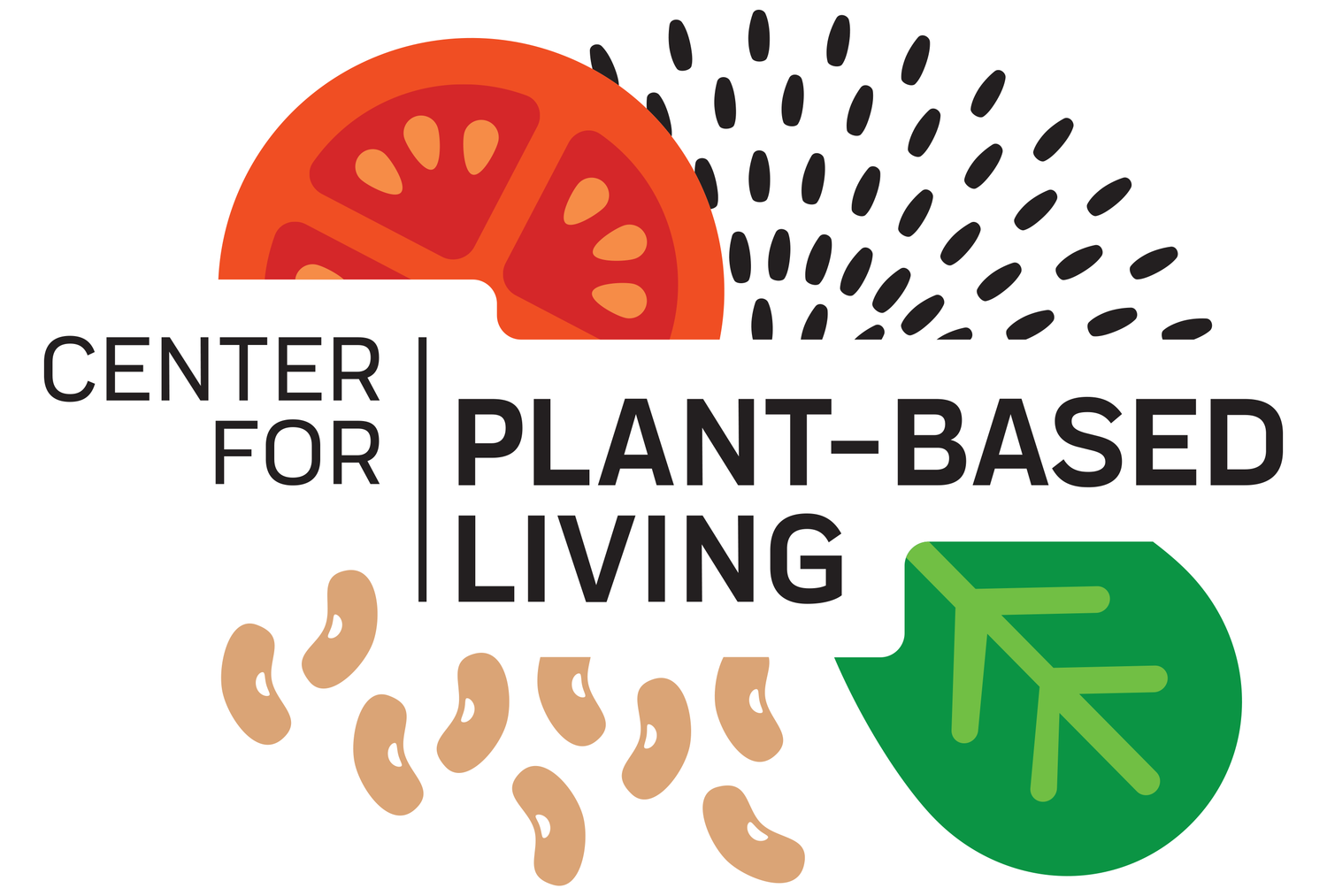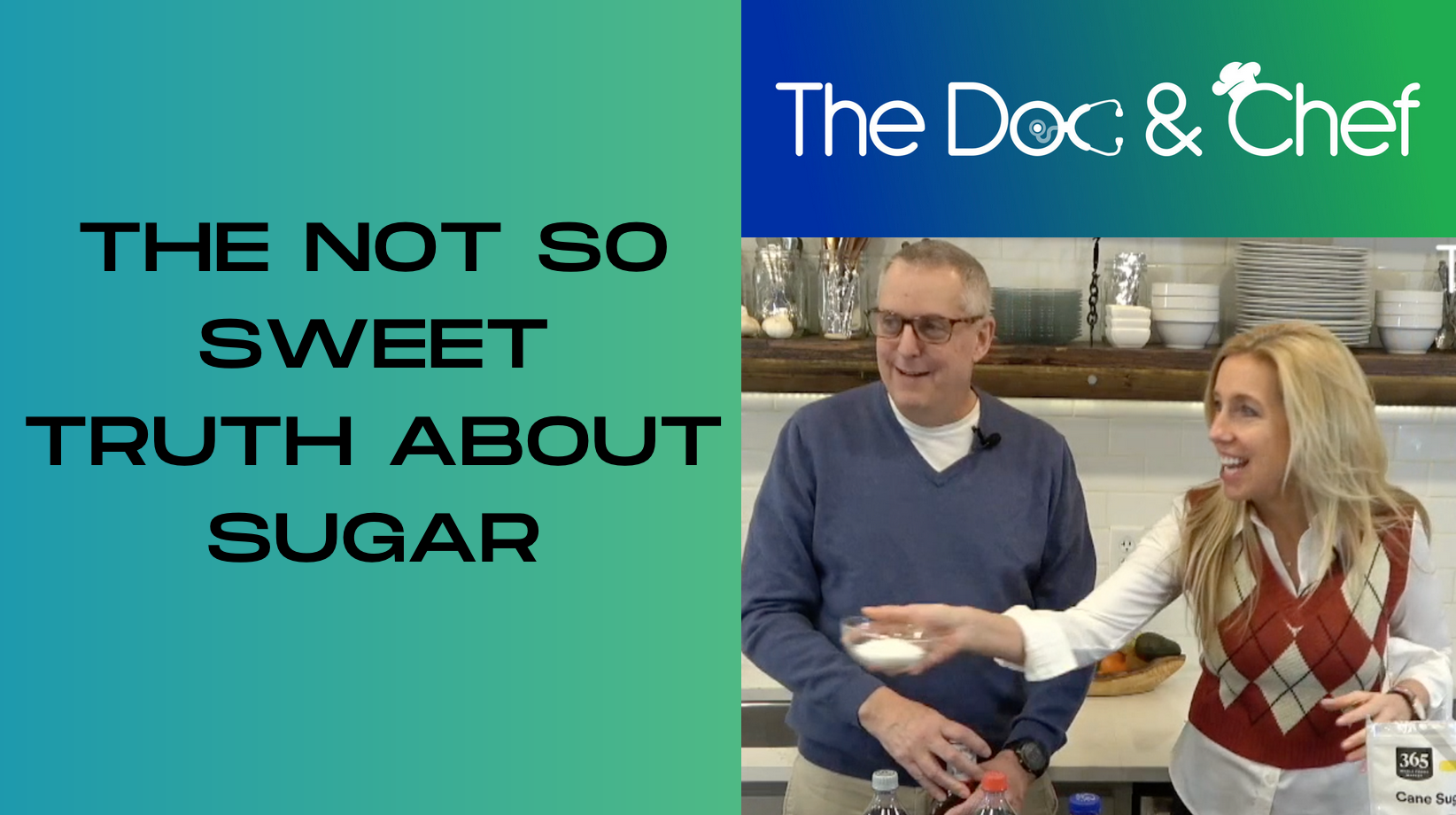THE DOC AND CHEF SHOW EP. 6: THE NOT SO SWEET TRUTH ABOUT SUGAR // SUPPORTING SCIENCE AND THE RECIPE
The average added sugar intake for Americans is almost 60 pounds per person per year, which equals about 17 teaspoons per day.[1] These added sugars supply almost 20% of daily calories,, way above the recommend less than 10% recommended by the 2020–2025 Dietary Guidelines for Americans.[2] This added sugar comes from many sources, including:[3]
Sugary beverages: Soft drinks, energy drinks, fruit juices, sports drinks, sweetened teas, and flavored coffees often contain high amounts of added sugars.
Sweets and desserts: Candy, chocolate, cookies, cakes, pastries, ice cream, and other sugary treats are major sources of added sugar.
Breakfast cereals: Many breakfast cereals, especially those marketed to children, contain significant amounts of added sugar.
Processed foods: Packaged snacks, including granola bars, snack cakes, flavored yogurt, flavored oatmeal, and some types of bread, often have added sugars.
Sauces and condiments: Ketchup, barbecue sauce, salad dressings, and sweetened marinades can contain added sugar.
Canned and processed fruits: Fruits packed in syrup or sweetened fruit juices can have added sugars.
Flavored milk and yogurt: Some flavored milk and yogurt products have added sugars for taste enhancement.
Baked goods: Pastries, bread, muffins, and other baked goods can contain added sugars.
Ready-to-eat meals: Many pre-packaged meals, including frozen dinners, can have added sugars in their sauces, dressings, or seasonings.
Snack foods: Snack chips, pretzels, and even some savory snacks can have added sugars.
And, to make matters worse, food companies use different forms of sugars, which can create a lot of confusion. These include:
Excess sugar intake can have several adverse health consequences. Here are some of the potential effects of consuming too much sugar:[4]
Weight gain and obesity: High sugar intake can contribute to weight gain and obesity. Sugary foods and beverages are often high in calories but low in nutritional value, leading to an imbalance in energy intake.
Increased risk of chronic diseases: Excessive sugar consumption has been linked to an increased risk of chronic conditions such as type 2 diabetes, heart disease, and certain types of cancer. A diet high in added sugars can lead to insulin resistance, inflammation, and dyslipidemia, which are risk factors for these diseases.
Tooth decay: Sugar is a major contributor to tooth decay and cavities. Bacteria in the mouth feed on sugars and produce acids that can erode tooth enamel, leading to dental problems.
Unhealthy blood sugar levels: Consuming large amounts of sugar can cause blood sugar levels to spike, leading to a rapid increase in insulin production. Over time, this can contribute to insulin resistance and the development of type 2 diabetes.
Increased risk of cardiovascular disease: Diets high in added sugars have been associated with an increased risk of heart disease. Excessive sugar intake can raise blood pressure, triglyceride levels, and LDL cholesterol, all of which are risk factors for cardiovascular problems.
Nutritional deficiencies: Foods high in added sugars often lack essential nutrients and can displace more nutritious foods from the diet. This can lead to deficiencies in vitamins, minerals, and other important nutrients.
Negative impact on mental health: Some studies have suggested a link between high sugar intake and an increased risk of mental health issues such as depression and anxiety. However, further research is needed to establish a clear causal relationship.
As consumers have become more aware of the dangers of excess sugar consumption, they often turn to foods that contain artificial sweeteners, because they perceive they are healthier.[5] These include:
Aspartame: Aspartame is one of the most widely used artificial sweeteners and is commonly found in diet sodas, sugar-free gum, and other low-calorie or sugar-free products.
Sucralose: Sucralose is derived from sugar but undergoes a chemical modification to make it non-caloric. It is commonly marketed under the brand name Splenda and is used in a variety of products such as beverages, baked goods, and dairy products.
Saccharin: Saccharin has been used as an artificial sweetener for many years. It is often found in tabletop sweeteners and various low-calorie or sugar-free products.
Acesulfame potassium (Ace-K): Acesulfame potassium is a calorie-free sweetener commonly used in combination with other sweeteners to enhance sweetness. It can be found in a range of products, including beverages, desserts, and baked goods.
Neotame: Neotame is a relatively newer artificial sweetener that is chemically similar to aspartame but is much sweeter. It is used in various food and beverage products.
Another class of artificial sweeteners are sugar alcohols. These include:
However, research suggests that these artificial sweeteners also carry significant health risks. These include:
Appetite dysregulation, leading to weight gain and worsening blood sugar control.[6]
Increased risk for heart disease and stroke.[7]
Increased risk for cancer.[8]
Altered gut bacteria.[9]
GI distress, such as bloating and diarrhea, especially with the sugar alcohols.[10]
It is important to note that the sugar that occurs naturally in fruit (not fruit juice!) does not carry the same health risks as added sugar and in fact, regular fruit consumption has been associated with many health benefits[11]. This is because whole fruits have fiber, which slows the absorption of sugar, so our bodies don’t need to produce nearly as much insulin. Therefore, most fruits have a low glycemic index or glycemic load, which is a measure of how certain foods affect blood sugar. [12]
In summary, stay away from all the hidden sugar found in many beverages and processed foods. If you need a sweetener, next time try using dates/date paste, applesauce, molasses, or maple syrup. Your body will thank you!
[1] https://www.cdc.gov/nutrition/data-statistics/added-sugars.html
[2] https://www.dietaryguidelines.gov/
[3] Front Nutr. 2021 Jun 17;8:687643
[4] Nutrients. 2016 Nov 4;8(11):697
[5] Am J Clin Nutr. 2012 Sep;96(3):640-6
[6] Nutrients. 2022 Mar 16;14(6):1261.
[7] Stroke. 2019 Mar;50(3):555-562.
[8] PLoS Med. 2022 Mar 24;19(3):e1003950
[9] Nutrients. 2022 Apr 18;14(8):1682
[10] Adv Nutr. 2017 Jul 14;8(4):587-596.
[11] Nutrients. 2018 Nov 28;10(12):1833
[12] https://lpi.oregonstate.edu/mic/food-beverages/glycemic-index-glycemic-load
🥦 Do you know about our STREAMING PLUS membership?
Our membership is built like a streaming service - you get a full library of plant-based cooking classes to watch whenever you want. PLUS, you gain access to upcoming interactive virtual cooking classes and a monthly accountability group call.
As a member you get:
Complete library of all past virtual classes - stream them whenever you’d like!
Free access to upcoming virtual classes
Library of easy and quick recipes: 100 and growing
Access to private Facebook group
Monthly accountability check-in and support group Zoom call with Caryn
Quarterly “Ask the Doc” call with Dr. Jim Loomis, our Medical Director
A community of support
To learn more, please visit us here.





